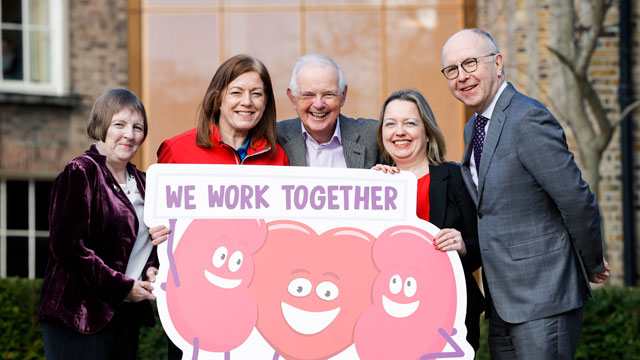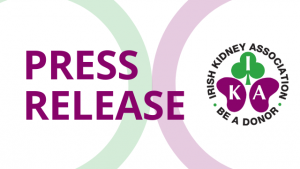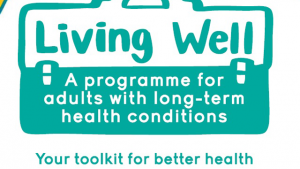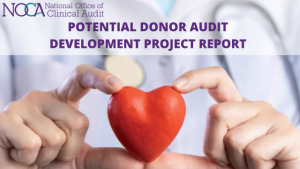The Irish Kidney Association (IKA) and the National Renal Office (NRO), together with the Irish Heart Foundation and Croí Heart and Stroke Charity, are joining forces for a campaign to raise awareness about the close link between Heart Disease and Chronic Kidney Disease. This campaign will mark World Kidney Day which will be celebrated on Thursday, 9th March 2023, and will include a free public webinar titled ‘Kidney and Heart Health Go Hand in Hand’.
Heart health and kidney health are closely related, as the heart pumps oxygen-rich blood to all parts of the body including the kidneys, which in turn control blood pressure, and clean the blood (removing waste products). Chronic Kidney Disease (CKD) can cause heart disease and vice versa, making it important to understand the relationship between these two conditions and ways to reduce the risks associated with them.
Known as the ‘hidden disease’, 1 in 8 people have Chronic Kidney Disease (CKD), with many unaware they have it. While only 1 in 1,000 people will reach End Stage Kidney Disease (ESKD) for which the only treatment is conservative care[1], dialysis or a kidney transplant, those with any of the five stages* of CKD are at risk of developing Heart Disease. Conservative estimates are that at least 50% of those with CKD Stages 4 or 5 have cardiac disease, and at least 50% of those with heart failure have CKD.
Diabetes and High Blood Pressure are leading causes of both Chronic Kidney Disease (CKD) and Heart Disease. Even without these conditions, CKD can increase the risk of heart problems, and heart disease can lead to kidney problems. CKD is often associated with Anaemia, which reduces the blood’s ability to carry oxygen, putting extra strain on the heart.
To reduce the risk of both kidney disease and heart disease, it is important to follow a healthy diet, be physically active, and stay engaged with your own healthcare. Knowing your numbers, such as blood pressure, blood sugar, and weight, can help detect any changes that may indicate a problem. Regular check-ups with your doctor, attending specialists’ appointments when scheduled, and knowing when to seek urgent medical attention are also important. Understanding your own medications and ensuring your doctor and pharmacist are aware of all of the medications you take to avoid side effects are also key.
Attending a photocall to announce the campaign at the Museum of Modern Literature in Ireland (MoLI) on St Stephen’s Green, was Prof. George Mellotte, National Clinical Lead, National Renal Office, who said, “The National Renal Office is pleased to support the Irish Kidney Association in its efforts to raise awareness about this important issue. Our shared goal is to educate and empower individuals to take control of their health and to reduce the risk of chronic kidney disease and heart disease. We encourage everyone to participate in this important campaign and to join us in our efforts to improve kidney and heart health in Ireland”.
Carol Moore, Chief Executive, Irish Kidney Association, said, “World Kidney Day on 9th March 2023 provides a platform for the Irish Kidney Association to raise awareness about the importance of kidney health and the close relationship with heart health. The Irish Kidney Association and the National Renal Office (NRO) invites all healthcare professionals, pharmacists and the general public to join them in marking this important occasion. By working together we can help to reduce the burden of chronic kidney disease and heart disease and improve the health of our communities”.
Neil Johnson, CEO, Croí, the Heart & Stroke Charity, advised, “We are delighted to support World Kidney Day as an opportunity to highlight the significant interdependent relationship between our heart and the kidneys. Keeping our Hearts healthy helps keep our Kidneys healthy and vice versa. Maintaining good cardiovascular health such as having a balanced and healthy diet, achieving healthy cholesterol and blood pressure levels, taking regular exercise, and having a healthy weight are all linked to a healthy heart and reducing the risk of kidney disease. It is important for people to know that heart health and kidney health are inextricably linked”.
Janis Morrissey, Director of Health Promotion with the Irish Heart Foundation, said, “We are proud to partner with the Irish Kidney Association to highlight the close links between heart health and kidney health. By raising awareness together for World Kidney Day, we hope to encourage people with kidney disease or heart disease to talk to their doctor, know the risks they can control and take manageable steps to look after their health.”
The Irish Kidney Association is delighted to have received the support of the Irish Pharmacy Union and a number of pharmacy chains who are backing the campaign through promotion and display of materials.
As part of the campaign, a free webinar hosted by the Irish Kidney Association (IKA), with Prof. George Mellotte and a patient, titled ‘Kidney Health and Heart Health Go Hand in Hand’, will be held on World Kidney Day, 9th March (at 6.30pm). Further information on the IKA’s campaign including promotional materials and details of the webinar, which is open to the public who can register in advance, can be found on the IKA website www.ika.ie/kidneyhealth
The theme for World Kidney Day 2023 is ‘Kidney Health For All, Preparing for the Unexpected, Supporting the Vulnerable!’ www.worldkidneyday.org
– ENDS –
[1] Focus on treating the symptoms of kidney failure as they arise.
ADVICE FOR HEALTHCARE PROFESSIONALS INCLUDING GPs & PHARMACISTS
If a patient has cardiac disease, suggest screening for kidney disease and vice versa.
Pharmacists: Check if a patient has a diagnosis of CKD and if they do, check the drug database for interactions.
Pharmacists: Suggest agreeing Blood Pressure target with their GP. This is usually less than 140/90, but for some people is less than 130/80.
Suggest screening for Diabetes and, if present, make sure patient knows target blood sugar range and monitor their HBA1c.
Suggest patient monitors their weight as increasing weight could be caused by the patient’s body retaining fluid.
Advise patients on a healthy lifestyle referring to other partners as necessary.
Advise patients on ‘sick day rules’. Medications for which ‘sick day rules’ apply are SADMANS.
S sulfonylureas, other secretagogues
A ACE inhibitors
D diuretics, direct renin inhibitor
M metformin
A angiotensin receptor blockers
N nonsteroidal anti-inflammatory drugs
S SGLT2 inhibitors, or “flozins”
Patients should have individualised recommendations of what to do with these medications if unwell (are dehydrated with vomiting or diarrhoea) to avoid Acute Kidney Injury.




